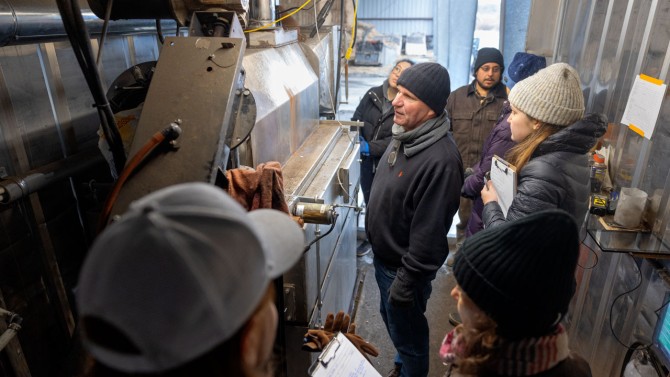Cornell expertise helps turn dairy waste into a soil amendment with environmental and economic benefits.
NY’s first dairy farm biochar kiln advances green agriculture
By Blaine Friedlander, Cornell Chronicle
To make New York agriculture greener, an alumnus-owned farm in Union Springs will become the state’s first commercial dairy to take separated solids from digested cow manure and run it through a kiln to create environmentally friendly biochar – thanks to Cornell expertise and co-funding from the New York State Energy Research and Development Authority (NYSERDA).
Biochar, which is similar to charcoal, is made in a kiln from organic residue such as manure. Added to soil, it can retain nutrients, decrease manure storage costs, sequester carbon and reduce odors in the surrounding area.
“What’s going on at Spruce Haven Farm is quite amazing,” said Johannes Lehmann, the Liberty Hyde Bailey Professor in the School of Integrative Plant Science, in the College of Agriculture and Life Sciences. “The farm has a large manure digester and now it will have the ability to conduct pyrolysis (heated in the absence of oxygen) – the process of making biochar. They are integrating the idea of having multiple approaches to sustainability.”
Spruce Haven Farm, which has 2,030 cows and 1,770 heifers, and harvests about 3,800 acres of corn and alfalfa for feed, will lease the kiln from Biomass Controls, a company that provides solutions to sanitation challenges, headquartered in Woodstock, Connecticut. The farm tested the kiln throughout the fall. As part of the co-funding from NYSERDA, Arcadis, an international sustainable design, engineering and consultancy firm from Syracuse, New York, will conduct a third-party review and verification of the operations.
While Doug Young ’78, one of the farm’s owners, is hoping to improve nitrogen and phosphorus efficiency, he said their farm strives to improve human nutrition and achieve net-zero carbon dairy production.
“People drink too much soda and our society suffers from obesity, diabetes and heart disease,” he said. “Chronic diseases happen because humans aren’t getting the proper nutrition. Here, we’re working toward the highest level of nutrition with the lowest environmental footprint.”
Instead of only storing manure in a big lagoon and then adding it to agricultural soil, the farm’s manure digester – installed eight years ago – processes the cow waste and creates methane, which is converted to renewable natural gas to make electricity. This electricity is then sent to the regional grid. The separated solids of the digested manure are routed through the new pyrolysis kiln to become biochar, which can be more easily stored and amended to soil.
“It helps getting toward a circular process,” said Lehmann, who is also a professor in the Department of Global Development (CALS) and a faculty fellow at the Cornell Atkinson Center for Sustainability. “Otherwise, any overflow of phosphates in manure that ends up in Cayuga Lake or other water, contribute to pollution and algal blooms.”
In addition to examining the pilot project’s environmental benefits to the farm, the academic group will study the economic advantages too. They will learn the actual costs to the farmer and ascertain the farm’s financial savings through reducing the maintenance of manure storage.
Media Contact
Get Cornell news delivered right to your inbox.
Subscribe


